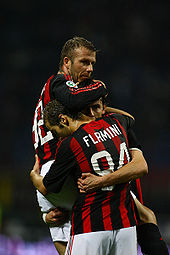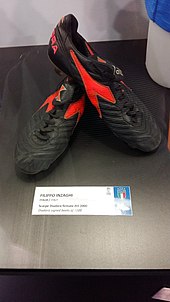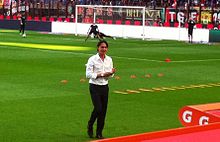Filippo Inzaghi
He represented his country at three FIFA World Cups, winning the 2006 edition, and he also took part at UEFA Euro 2000, where he won a runners-up medal.
[5] The elder brother of fellow footballer Simone Inzaghi,[6] he got his start playing for hometown club Piacenza as a teenager in 1991, but made only two league appearances before being loaned to Serie C1 side Leffe, with whom he scored an impressive 13 goals in 21 matches.
Upon his return to Piacenza, he scored 15 times in 37 games helping his team win Serie B and proving himself to be an exciting young prospect.
[10] He formed a formidable attacking partnership along with Alessandro Del Piero and Zinedine Zidane, a tandem which would last for four seasons, under managers Marcello Lippi, and subsequently Carlo Ancelotti, marking Inzaghi's longest stint with one team at the time.
During the second leg of the semi-finals in Turin, Inzaghi scored two goals in the first ten minutes, but Manchester United eventually managed to come back and win the match 3–2.
However, his once-effective partnership with Del Piero had become less effective in recent seasons, due to their lack of understanding, individualism, and their strained relationship both on and off the pitch.
[19][20][21] Despite scoring a high 89 goals in 165 games for the Bianconeri, Inzaghi was soon benched in favour of David Trezeguet and on 2 July 2001 signed for AC Milan[22][23] for a reported 70 billion lire,[10] or 45 billion lire cash plus Cristian Zenoni[24][25][26][27] (Sky Sports reported a smaller total figure, £17 million[28]) for the 2001–02 campaign by coach Fatih Terim.
Juventus announced that the sale of Inzaghi produced a capital gain of €31.1 million to the club, making the actual transfer fee much exceed that figure.
Upon his return, he was able to forge a strong goalscoring partnership with Andriy Shevchenko, and he soon earned many trophies with the Rossoneri under new manager Carlo Ancelotti, among them the 2002–03 Champions League (in which Milan defeated his previous team, Juventus, in the final on penalties), along with the 2002–03 Coppa Italia (scoring in a 2–2 draw in the second leg),[30] the 2003 UEFA Super Cup, the 2004 Supercoppa Italiana, and the 2003–04 Scudetto.
It's something that will stay with me all my life and two goals in the final speaks for itself.At the start of the 2007–08 season, he picked up where he left off in Athens, scoring the equalizer in the Super Cup in Milan's 3–1 victory over Sevilla.
Inzaghi capped off the year by scoring two goals in the final of the 2007 Club World Cup, helping Milan win 4–2 against Boca Juniors to take revenge for the defeat on penalties in 2003.
With ten hat-tricks in Serie A, Inzaghi is ahead of Giuseppe Signori (9), Hernán Crespo (8), Roberto Baggio, Marco van Basten, Gabriel Batistuta, Abel Balbo, Vincenzo Montella (7), Antonio Di Natale and David Trezeguet (6).
[33] In the 2009–10 season, under manager Leonardo, Inzaghi was relegated to the role of backup player with his contract set to expire in June 2010.
He also became the second-oldest player to score in the Champions League, aged 37 years and 85 days, behind only Manchester United's Ryan Giggs, now surpassed by Inzaghi's compatriot Francesco Totti.
Just like with Andrea Pirlo in 2011, Milan decided not to renew the contracts of several veteran players at the end of the season and Inzaghi was one of those, along with Gennaro Gattuso, Clarence Seedorf, Alessandro Nesta and Gianluca Zambrotta.
[37] With 70 goals, Inzaghi is the sixth-highest scorer in European club competitions, behind only Cristiano Ronaldo, Lionel Messi, Robert Lewandowski, Raúl and Karim Benzema.
He became the first player to score two Champions League hat-tricks – both with Juventus – when he netted a treble during a 4–4 group stage draw with Hamburger SV on 13 September 2000; his first was in a 4–1 victory over Dynamo Kyiv during the 1997–98 quarter–finals.
Inzaghi scored a record third Champions League hat-trick in a 4–0 win against Deportivo de La Coruña in the 2002–03 season, while playing for Milan.
Inzaghi earned his first senior cap for Italy in the Tournoi de France,[9] against Brazil on 8 June 1997, under his former under-21 manager Cesare Maldini, and provided an assist to goalscorer Alessandro Del Piero.
[47] Under Zoff's replacement, Giovanni Trapattoni, Inzaghi was Italy's top goalscorer during the qualifying rounds of the 2002 World Cup and Euro 2004,[48] scoring his first and only international hat-trick in a 4–0 home win over Wales on 6 September 2003,[49] although he missed the latter tournament due to injury.
[50] He went scoreless throughout the 2002 World Cup, making two appearances, as Italy were controversially eliminated in the round of 16 to co-hosts South Korea;[51] in Italy's 2–1 loss to Croatia in their second group match, Materazzi played a floating ball over the top from just over halfway to Inzaghi in the 90th minute, but everyone missed the ball and it rolled into the back of the net, although the goal was disallowed after referee Graham Poll claimed that Inzaghi had grabbed an opponent's shirt.
[53] Inzaghi's persistent knee and ankle injuries put a halt to his international play for almost two years before his resurgence at club level, which resulted in being called up by Italy coach Marcello Lippi for the 2006 World Cup final tournament.
[58] Inzaghi is currently the sixth-highest goalscorer in the Italian national team's history, with 25 goals, alongside Adolfo Baloncieri and Alessandro Altobelli.
Inzaghi was an intelligent, extremely fast, agile, and opportunistic player, with excellent reactions and a lanky, slender physique;[8][61][62][63][64][65][66][67][68] although not very technically gifted,[69] he was known for his great skill in taking advantage of the carelessness of his opponents, his excellent positional sense in the area, and his eye for goal,[69] making a name for himself as a "goal poacher", due to his style of play and tendency to operate mainly in the penalty box,[66] as well as his timing and ability to find spaces and anticipate opponents to get on the end of passes.
Tactically, Inzaghi was noted for his vision and ability to read the game,[73] as well as his outstanding offensive movement off the ball, ability to play off the shoulders of the last defender, and to time his attacking runs to beat the offside trap,[8] which allowed him to get on the end of passes, but also to provide depth to his team,[70] leading long-time Manchester United manager Sir Alex Ferguson to quip: "That lad must have been born offside.
"[74] Although in the past, due to his poor defensive work-rate and lack of notable technical skills, strength in the air or long range striking ability, he was initially accused by some in the sport for being a limited striker or a "lucky" player,[21][61][68] and also drew criticism at times for being selfish,[21][68][19][20][75][76] for not participating in the build-up of plays,[77] and for going to ground too easily,[8] he has been praised by several of his former managers and teammates for his prolific goalscoring.
[79] Inzaghi started his coaching career at the beginning of the 2012–13 season, signing a two-year deal as the manager of AC Milan's Allievi (under-17) team.
[94] On 16 August, Inzaghi made his debut for Brescia in the first round Coppa Italia match losing 4–2 in the penalty shoot-out after a 2–2 draw in the extra-time.








